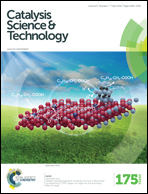Influence of alkali metals on Pd/TiO2 catalysts for catalytic oxidation of formaldehyde at room temperature†
Abstract
We previously observed that sodium (Na) addition had a dramatic promotion effect on Pd/TiO2 catalysts for formaldehyde (HCHO) oxidation. In this study, a series of alkali metal (Li, Na, K, Cs) doped Pd/TiO2 catalysts were prepared and tested for ambient temperature HCHO oxidation. The results showed that the doped alkali metals have a common promotion effect on the performance of the Pd/TiO2 catalysts for HCHO oxidation under ambient temperature, which followed the order K > Cs > Na > Li. X-ray diffraction (XRD), Brunauer–Emmett–Teller (BET), CO chemisorption, Transmission Electric Microscopy (TEM), temperature-programmed reduction by H2 (H2-TPR), X-ray photoelectron spectroscopy (XPS) and temperature-programmed desorption by O2 (O2-TPD) methods were used to characterize the alkali metal doped catalysts to investigate the mechanism of the alkali metal promotion effect. The results showed that a negatively charged and well-dispersed Pd species was induced and stabilized by alkali metal addition, which facilitates the activation of chemisorbed oxygen, and then enhances the performance of alkali metal doped Pd/TiO2 catalysts for room temperature HCHO destruction. The K–Pd/TiO2 catalyst in particular possessed the highest Pd dispersion degree with active sites, attributing to the best activity in ambient temperature HCHO oxidation.


 Please wait while we load your content...
Please wait while we load your content...